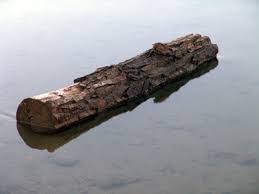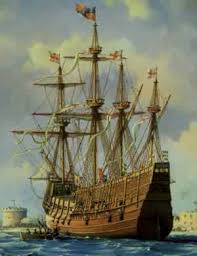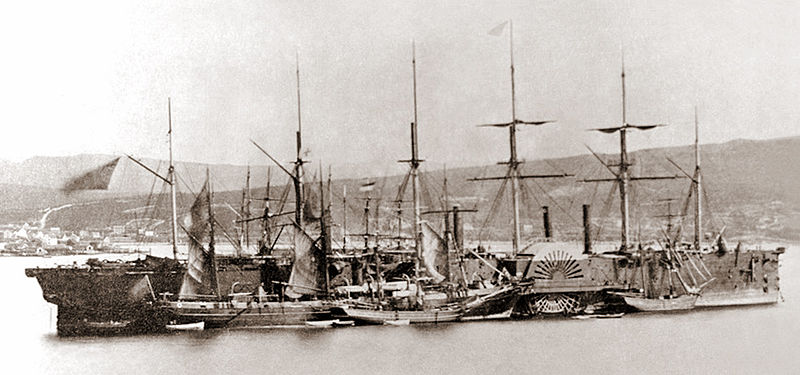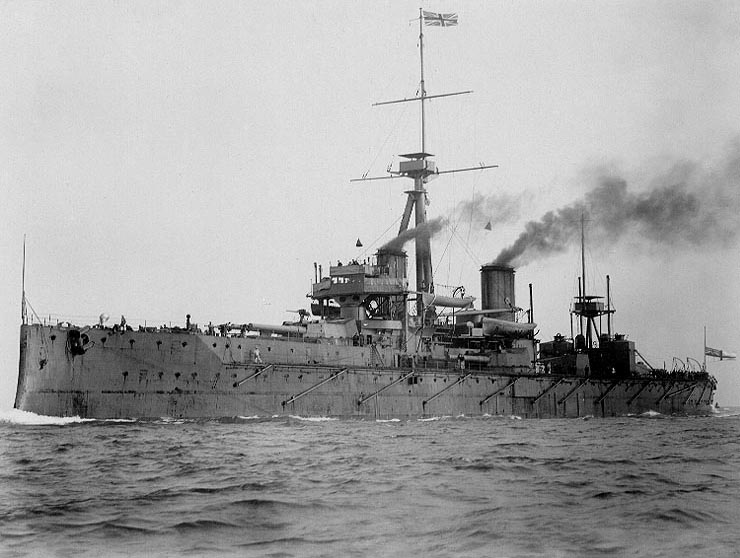Good morrow to ye, faithful follower!
This day, we shall be judging some of the greatest of all the fine, proud creatures which landlubbers call 'boats'. These mighty ships have explored the darkest corners of the map, or have won battles to let their names sail through time to reach us today. You may notice that hardly any of my heroes come from the present day- for indeed, in this modern, business-like world the time for heroes is past. Well, here they are...
HMS Log
 This is the Rotting Log. There is nothing interesting about her, other than the fact that she made us realise that it was possible to sail the ocean. Yes, she may not look like much, but here is one lady whom we can thank!
This is the Rotting Log. There is nothing interesting about her, other than the fact that she made us realise that it was possible to sail the ocean. Yes, she may not look like much, but here is one lady whom we can thank!
The Solar Bark
This boat was found in the Great Pyramid of Kheops; she was meant to bring the Pharaoh across the waters of the traitorous Duat, or underworld River, and into the afterlife. She is a copy of the boat which brought the god Ra against his mortal foe, Apophis.
The Humble Fishing Boat
This is thought to be the boat which carried Jesus across the Sea of Galilee. If this is true, then she's been through more than most of her kind- men walking on water and stopping storms and whatnot...
The Leifskip
She brought Leif Errikson, a Viking of the 11th century, all the way to America! Leif's brothers followed him there, and set up colonies that would last centuries. If only they'd lasted a little longer, they'd have given Columbus something to think about, hmm? This boat could seat around a hundred and twenty soldiers and half that amount of sailors- no cannon, sadly.
La Mora
Another mighty dame, this is the ship which brought William of Normandy to France. In Viking style, she was built with the peculiarity of being able to hold horses as well as men.
La Blanche-Nef
You've probably heard of her in history, though, if your teacher's English, he calls her the White Ship. This poor dear sunk in a storm, taking with her various Norman nobles, along with the son of Henry I. His death caused the period of civil warfare known as the Anarchy.
The Santa Maria Nao (tradesman)
She's far from pretty, and not spectacularly powerful, but this girl here brought Christopher Columbus to America! Bloody big-head- he sets out, on his ugly ship, and he's told to discover India. Not only does he fail, but he gets credit for discovering America, when such countries as Norway and Japan had been trading there for years!
This ship has hardly any cannons, which is, I'm sure, understandable- and most of its space is taken up by provisions.
The Mary Rose Unique
 Poor dear! Five Hundred men! Ninety one cannons! She was so heavily armoured, it was just too much- after firing a single volley, the aftermath simply made her tip over.
Poor dear! Five Hundred men! Ninety one cannons! She was so heavily armoured, it was just too much- after firing a single volley, the aftermath simply made her tip over.
The Golden Hind unique, inspired by Spanish Gallions
 Now we're talking! This is she who gave Sir Francis Drake victory against the Spanish Armada. She sports 22 guns- doesn't sound like much but it was more than enough for the type of Privateer work she was sent to do.
Now we're talking! This is she who gave Sir Francis Drake victory against the Spanish Armada. She sports 22 guns- doesn't sound like much but it was more than enough for the type of Privateer work she was sent to do.
The Zheng He Chuan Julun
This is the ship of a Chinese Admiral of Ming (East China), who travelled as far as South Africa. An amazing work of architecture, she was Forty feet long, and intended to do the same sort of work as the Santa Maria. Sadly, the Emperor forbade Zheng He to carry his plans to fruition. Look at that small ship next to her-that's the Maria!
The Nihon Maru Okina Fune
This good lady was the flagship of the Japanese Shogun Toyotomi Hideyoshi. She is equipped with 500 soldiers and 60 matchlock cannons. Though she was built to impress foreigners, she was used in the Korea war of 1592, with impressive results.
HMS Victory First Rate Ship-of-the-line
Well named indeed. This was the British flagship during the Battle of Trafalgar, though, contrary to popular belief, it wasn't Nelson's to command. While famous to the point of legend in England, its name is curiously never pronounced in France, and, true to my country, I shall continue to call it 'it'. IT would have been just about the biggest ship on earth, with a hundred and six guns and 850 sailors and soldiers, had the Santissima Trinidad not come to dethrone it.
Nuestra Señora de la Santissima Trinidad 140-gun first rate
The biggest ship of the line that ever existed; 1085 sailors and soldiers, 140 guns... She was always the proud flagship and mascot of the Spanish fleet, and lived a great old life- she'd been active for almost thirty years before Trafalgar, and in that battle alone, she brought down eight ships and mortally wounded eleven. Respects, madam...
HMS Warrior Warrior-class Armoured Frigate
Aye, here she is, lads- the first ever steam boat deemed useful. This one never fought, but what makes her special is the humongous amount of armour and, of course, the steam. She seems to be poorly armed with only forty cannons, but each and every one is an Armstrong gun, or else a 68-pounder- the strongest ship of the age. A visiting Frenchman described her as a "Black Snake among Rabbits". Well, she inspired quite some awe...
SS. Great Britain
The first steam boat ever to be opened to public, she was designed by the great engineer I.K Brunel. The sails were rarely used, but when they were, she could be expected to reach speeds of 15 knots on her journeys to America. It was on this boat that the word "POSH" was invented; the higher classes wanted to stay South, where it was said to be warmer; so they stayed on "Port (left of the ship) Out, Starboard (right of the ship) Home. POSH.
iTech takes over
SS. Great Eastern
 When she was launched in the late 1850s she was the biggest ship ever. She was one of Brunel's great works and yet she did not enjoy much success - on a test cruise one of the boilers blew up after someone decided that safety valves could be sealed off quite safely. She was launched sideways, which was very unusual. The ship was amazing yet had an unsuccessful career. However one of her many claims to fame was to have laid the first transatlantic telegraph cable to last for any length of time. .-/.-../.-.. ...-/./.-./-.-- --./---/---/-..
When she was launched in the late 1850s she was the biggest ship ever. She was one of Brunel's great works and yet she did not enjoy much success - on a test cruise one of the boilers blew up after someone decided that safety valves could be sealed off quite safely. She was launched sideways, which was very unusual. The ship was amazing yet had an unsuccessful career. However one of her many claims to fame was to have laid the first transatlantic telegraph cable to last for any length of time. .-/.-../.-.. ...-/./.-./-.-- --./---/---/-..
HMS Dreadnought (launched 1906)
 HMS Dreadnought was the first of the Dreadnought class of warships and was revolutionary in both size and speed. She was the first ship to use steam turbines and could steam at over 21 knots. However the only action she saw was when she sank a submarine during WWI.
HMS Dreadnought was the first of the Dreadnought class of warships and was revolutionary in both size and speed. She was the first ship to use steam turbines and could steam at over 21 knots. However the only action she saw was when she sank a submarine during WWI.
This day, we shall be judging some of the greatest of all the fine, proud creatures which landlubbers call 'boats'. These mighty ships have explored the darkest corners of the map, or have won battles to let their names sail through time to reach us today. You may notice that hardly any of my heroes come from the present day- for indeed, in this modern, business-like world the time for heroes is past. Well, here they are...
HMS Log
The Solar Bark
This boat was found in the Great Pyramid of Kheops; she was meant to bring the Pharaoh across the waters of the traitorous Duat, or underworld River, and into the afterlife. She is a copy of the boat which brought the god Ra against his mortal foe, Apophis.
The Humble Fishing Boat
This is thought to be the boat which carried Jesus across the Sea of Galilee. If this is true, then she's been through more than most of her kind- men walking on water and stopping storms and whatnot...
The Leifskip
She brought Leif Errikson, a Viking of the 11th century, all the way to America! Leif's brothers followed him there, and set up colonies that would last centuries. If only they'd lasted a little longer, they'd have given Columbus something to think about, hmm? This boat could seat around a hundred and twenty soldiers and half that amount of sailors- no cannon, sadly.
La Mora
Another mighty dame, this is the ship which brought William of Normandy to France. In Viking style, she was built with the peculiarity of being able to hold horses as well as men.
La Blanche-Nef
You've probably heard of her in history, though, if your teacher's English, he calls her the White Ship. This poor dear sunk in a storm, taking with her various Norman nobles, along with the son of Henry I. His death caused the period of civil warfare known as the Anarchy.
The Santa Maria Nao (tradesman)
She's far from pretty, and not spectacularly powerful, but this girl here brought Christopher Columbus to America! Bloody big-head- he sets out, on his ugly ship, and he's told to discover India. Not only does he fail, but he gets credit for discovering America, when such countries as Norway and Japan had been trading there for years!
This ship has hardly any cannons, which is, I'm sure, understandable- and most of its space is taken up by provisions.
The Mary Rose Unique
The Golden Hind unique, inspired by Spanish Gallions
The Zheng He Chuan Julun
This is the ship of a Chinese Admiral of Ming (East China), who travelled as far as South Africa. An amazing work of architecture, she was Forty feet long, and intended to do the same sort of work as the Santa Maria. Sadly, the Emperor forbade Zheng He to carry his plans to fruition. Look at that small ship next to her-that's the Maria!
The Nihon Maru Okina Fune
This good lady was the flagship of the Japanese Shogun Toyotomi Hideyoshi. She is equipped with 500 soldiers and 60 matchlock cannons. Though she was built to impress foreigners, she was used in the Korea war of 1592, with impressive results.
HMS Victory First Rate Ship-of-the-line
Well named indeed. This was the British flagship during the Battle of Trafalgar, though, contrary to popular belief, it wasn't Nelson's to command. While famous to the point of legend in England, its name is curiously never pronounced in France, and, true to my country, I shall continue to call it 'it'. IT would have been just about the biggest ship on earth, with a hundred and six guns and 850 sailors and soldiers, had the Santissima Trinidad not come to dethrone it.
Nuestra Señora de la Santissima Trinidad 140-gun first rate
The biggest ship of the line that ever existed; 1085 sailors and soldiers, 140 guns... She was always the proud flagship and mascot of the Spanish fleet, and lived a great old life- she'd been active for almost thirty years before Trafalgar, and in that battle alone, she brought down eight ships and mortally wounded eleven. Respects, madam...
HMS Warrior Warrior-class Armoured Frigate
Aye, here she is, lads- the first ever steam boat deemed useful. This one never fought, but what makes her special is the humongous amount of armour and, of course, the steam. She seems to be poorly armed with only forty cannons, but each and every one is an Armstrong gun, or else a 68-pounder- the strongest ship of the age. A visiting Frenchman described her as a "Black Snake among Rabbits". Well, she inspired quite some awe...
SS. Great Britain
The first steam boat ever to be opened to public, she was designed by the great engineer I.K Brunel. The sails were rarely used, but when they were, she could be expected to reach speeds of 15 knots on her journeys to America. It was on this boat that the word "POSH" was invented; the higher classes wanted to stay South, where it was said to be warmer; so they stayed on "Port (left of the ship) Out, Starboard (right of the ship) Home. POSH.
iTech takes over
SS. Great Eastern
 When she was launched in the late 1850s she was the biggest ship ever. She was one of Brunel's great works and yet she did not enjoy much success - on a test cruise one of the boilers blew up after someone decided that safety valves could be sealed off quite safely. She was launched sideways, which was very unusual. The ship was amazing yet had an unsuccessful career. However one of her many claims to fame was to have laid the first transatlantic telegraph cable to last for any length of time. .-/.-../.-.. ...-/./.-./-.-- --./---/---/-..
When she was launched in the late 1850s she was the biggest ship ever. She was one of Brunel's great works and yet she did not enjoy much success - on a test cruise one of the boilers blew up after someone decided that safety valves could be sealed off quite safely. She was launched sideways, which was very unusual. The ship was amazing yet had an unsuccessful career. However one of her many claims to fame was to have laid the first transatlantic telegraph cable to last for any length of time. .-/.-../.-.. ...-/./.-./-.-- --./---/---/-..HMS Dreadnought (launched 1906)
 HMS Dreadnought was the first of the Dreadnought class of warships and was revolutionary in both size and speed. She was the first ship to use steam turbines and could steam at over 21 knots. However the only action she saw was when she sank a submarine during WWI.
HMS Dreadnought was the first of the Dreadnought class of warships and was revolutionary in both size and speed. She was the first ship to use steam turbines and could steam at over 21 knots. However the only action she saw was when she sank a submarine during WWI.
Yours, most cordially,
| iTech |









